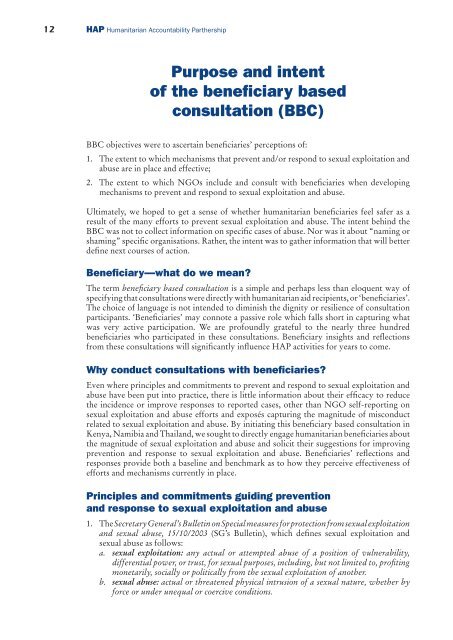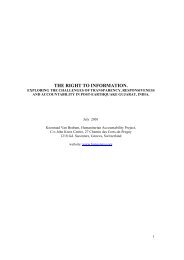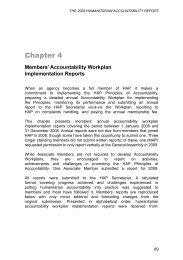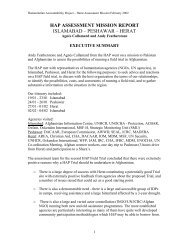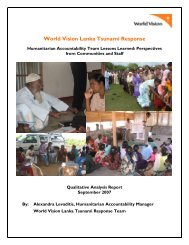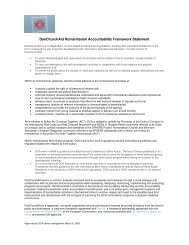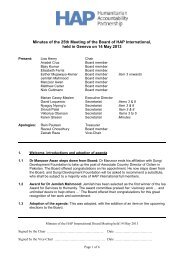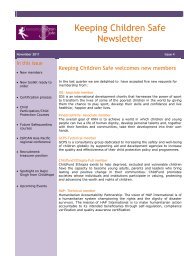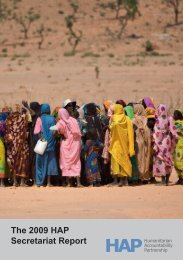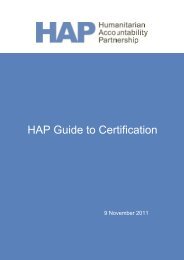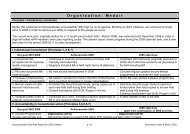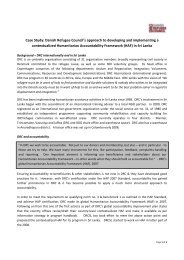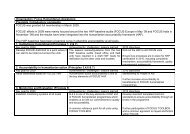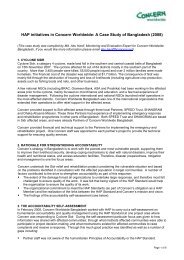TO COMPLAIN OR NOT TO COMPLAIN: STILL THE QUESTION ...
TO COMPLAIN OR NOT TO COMPLAIN: STILL THE QUESTION ...
TO COMPLAIN OR NOT TO COMPLAIN: STILL THE QUESTION ...
You also want an ePaper? Increase the reach of your titles
YUMPU automatically turns print PDFs into web optimized ePapers that Google loves.
12 HAP Humanitarian Accountability Parthership<br />
Purpose and intent<br />
of the beneficiary based<br />
consultation (BBC)<br />
BBC objectives were to ascertain beneficiaries’ perceptions of:<br />
1. The extent to which mechanisms that prevent and/or respond to sexual exploitation and<br />
abuse are in place and effective;<br />
2. The extent to which NGOs include and consult with beneficiaries when developing<br />
mechanisms to prevent and respond to sexual exploitation and abuse.<br />
Ultimately, we hoped to get a sense of whether humanitarian beneficiaries feel safer as a<br />
result of the many efforts to prevent sexual exploitation and abuse. The intent behind the<br />
BBC was not to collect information on specific cases of abuse. Nor was it about “naming or<br />
shaming” specific organisations. Rather, the intent was to gather information that will better<br />
define next courses of action.<br />
Beneficiary—what do we mean?<br />
The term beneficiary based consultation is a simple and perhaps less than eloquent way of<br />
specifying that consultations were directly with humanitarian aid recipients, or ‘beneficiaries’.<br />
The choice of language is not intended to diminish the dignity or resilience of consultation<br />
participants. ‘Beneficiaries’ may connote a passive role which falls short in capturing what<br />
was very active participation. We are profoundly grateful to the nearly three hundred<br />
beneficiaries who participated in these consultations. Beneficiary insights and reflections<br />
from these consultations will significantly influence HAP activities for years to come.<br />
Why conduct consultations with beneficiaries?<br />
Even where principles and commitments to prevent and respond to sexual exploitation and<br />
abuse have been put into practice, there is little information about their efficacy to reduce<br />
the incidence or improve responses to reported cases, other than NGO self-reporting on<br />
sexual exploitation and abuse efforts and exposés capturing the magnitude of misconduct<br />
related to sexual exploitation and abuse. By initiating this beneficiary based consultation in<br />
Kenya, Namibia and Thailand, we sought to directly engage humanitarian beneficiaries about<br />
the magnitude of sexual exploitation and abuse and solicit their suggestions for improving<br />
prevention and response to sexual exploitation and abuse. Beneficiaries’ reflections and<br />
responses provide both a baseline and benchmark as to how they perceive effectiveness of<br />
efforts and mechanisms currently in place.<br />
Principles and commitments guiding prevention<br />
and response to sexual exploitation and abuse<br />
1. The Secretary General’s Bulletin on Special measures for protection from sexual exploitation<br />
and sexual abuse, 15/10/2003 (SG’s Bulletin), which defines sexual exploitation and<br />
sexual abuse as follows:<br />
a. sexual exploitation: any actual or attempted abuse of a position of vulnerability,<br />
differential power, or trust, for sexual purposes, including, but not limited to, profiting<br />
monetarily, socially or politically from the sexual exploitation of another.<br />
b. sexual abuse: actual or threatened physical intrusion of a sexual nature, whether by<br />
force or under unequal or coercive conditions.


